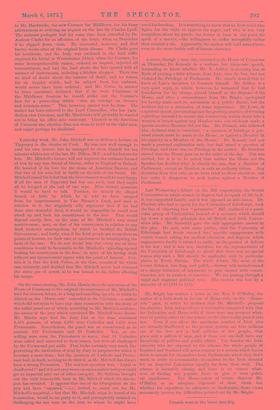A scene, though a tame one, occurred in the House
of Commons on Thursday, Dr. Kenealy, in a verbose, but temperate speech, demanding to know whether Mr. E. Ashley, in accusing him at Ryde of putting a false witness, Jean Luie, into the box, had not violated the Privilege of Parliament. He utterly denied that he knew of Luie's intention to forswear himself. Mr. Ashley, in a very quiet reply, in which, however, he intimated that he had foundation for his charge, placed himself at the disposal of the House, and after a remonstrance from Mr. Bright, apologised for having made such an accusation at a public dinner, but the incident led to a discussion of some importance. Mr. Lowe, in a spirited speech, protested against the growing practice of wresting a privilege intended to secure fair controversy within doors into a weapon of attack against any Member who out-of-doors made a speech another Member did not like. Mr. Disraeli, who followed him, declared that to constitute " a question of Privilege a per- sonal attack must be made in the House, or against a Member in his capacity as a Member of the House." Dr. Kenealy had not made a personal explanation only, but had raised a question of Privilege, and there was no Privilege in the matter. He therefore moved that the House pass on to the order of the day. This was carried, but it is to be noted that. neither the House nor the Speaker has decided what is clearly the case, that a Member of Parliament, except as Member, is only an ordinary citizen. Any deviation from that rule, as we have tried to show elsewhere, can but make it dangerous to seek justice against a Member of Parliament.


































 Previous page
Previous page